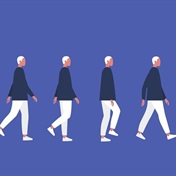Alzheimer's disease could cause a global cash crunch in coming generations, as people begin to regularly live to 100, and must be considered a serious fiscal danger, experts said.
Already 24-37 million people worldwide live with the incurable form of dementia, and that number is projected to reach 115 million by 2050, a panel of Alzheimer's disease experts told the US House Committee on Foreign Affairs.
As women bear fewer children and the population ages, the world will become increasingly ill-prepared to cope with large numbers of dependent elderly people and must begin investing more in research to prevent the disease, they said.
Places like Russia, Europe, the United States and parts of Asia are experiencing "declining populations, fewer workers and more people dependent upon public health systems for their support," said George Vradenburg, founder of an advocacy group called USAgainstAlzheimer's.
"That is producing fiscal stress on our health systems around the world and it is producing the risk that the developed world, particularly the Asian rim and particularly western Europe, are going to be declining in their economic growth and prosperity in the coming years."
According to the London-based Alzheimer's Disease International, the total estimated worldwide cost of the disease in 2010 was $604 billion (about R4.1 trillion), or nearly 1% of global GDP.
"If Alzheimer's were a country, it would be the 18th largest economy based on GDP," said Daisy Acosta, the chair of ADI, describing Alzheimer's as "the single most important health and social crisis of the 21st century."
Impact of the disease
"The impact of this disease today is massive and will accelerate with the years to come," she said.
And yet, compared to other major health woes such as cancer and HIV/Aids, the amount of research money being spent on preventing it is minimal.
"We invest six billion a year for cancer, four billion dollars a year for heart disease, $2 billion (about R13 million) a year for Aids," said Bill Thies, chief scientific officer at the Alzheimer's Association.
"We are at about 450 million a year for Alzheimer's disease," he said. "Without increasing that significantly we are going to see the peak of this epidemic and we are going to see the worst possibilities of it."
The experts acknowledged that the strain of caring for an Alzheimer's patient usually falls on the family, but in the years to come nations as a whole could prepare themselves better by considering how to run an ageing economy.
"My grandchildren, ageing experts tell me, will live to 110 or 120," said Vradenburg, noting that after age 85 one in two people is diagnosed with dementia.
Keeping economies from collapsing
"We are going to see increasingly a physically able population but a cognitively disabled population."
In order to prevent the older set from consuming a nation's economic resources for health care, countries must think about how to put dementia patients to work in order to keep their economies from collapsing, he said.
"We need to change our ageing populations from people who are taking a public benefit... and turn them into productive taxpayers who are participants in the workforce," Vradenburg said.
"Those countries that get it right and figure out how to support their ageing populations, keeping them healthy and keeping them productive, are going to be winners in the 21st century."
Those who do not will be "losers," he added.
"It is critical for the world to begin to recognise this not just as a health issue but as a fiscal issue."
Eric Hall, president of the Alzheimer's Foundation of America, called for a global meeting early next year to compare notes among nations on how to best approach the problem and formulate a global action plan.
House Representative Ed Markey, a Democrat from Massachusetts, said the world must come together to find a solution.
"We are in a race against time here... and that is across the whole planet," said Markey. "It is imperative for us to have an action plan that does work, because failure is not an option here."
(Sapa, June 2011)
Read more:




 Publications
Publications
 Partners
Partners














